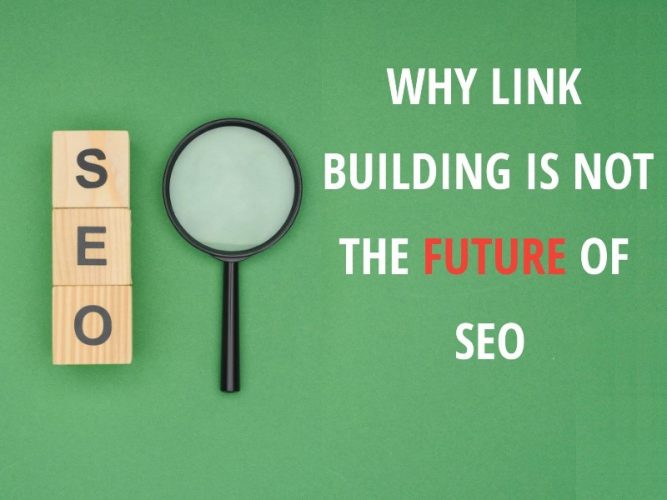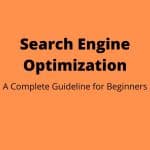In 2021 the technique of SEO has been changed. The search engine giant Google has focusing more on user experience, load speed, etc. rather than link building. Link building will work for building traffic funnels. Here I’m sharing why link building is not the future of SEO.
Over the last few years, SEO focused almost entirely on link building since this was and still is a good way to impact rankings. While it’s true that link building does help ranking, there is a great misconception many internet marketers and website owners have and that is focusing too much time on building links. But if you shouldn’t be spending your time on building links, what should you be focusing on?
Well, as most companies would agree, it’s user experience and that’s because this is one of the main factors that can affect rankings a lot more than anything else. Let’s take a closer look at some of the ways this can affect rankings and why improving user experience is better than link building.
What’s best for users is best for Google
As you probably know by now, Google generates a big part of its revenue from ads. So if users were to search for something and the results would not be relevant, what do you think they’d stop doing? Well, it’s using Google as their primary search engine, right? Of course!
That’s why in order to make sure that will never happen, Google need to be always on top of its game and continually ensure that it provides users with the best possible search results based on their search terms. However, it’s important to keep in mind that this doesn’t really come down to on-page code or links. It actually comes down to user experience.
Everyone reading this shouldn’t think that optimizing their website and having links makes no difference in increasing their online visibility. These tactics surely help out a lot in that regard by making sure the search engine spiders immediately crawl websites and index them, but Google would rather rank a relevant page with no or few links, rather than an irrelevant website that contains dozens or even hundreds of links, but is only partially relevant.
So to make it easier for you to understand how Google ranks your website, let’s take a closer look below:
Time on-site:
After someone makes a search on Google, they’re eventually going to click on a listing. Of course, a portion of those people who performed a search landed on a website and then clicked the Back button will indirectly tell Google that the website is not relevant. Of course, they need to hit the Back button in about 3 seconds for Google to register that.
Bounce rate:
When a user clicks the Back button after landing on a page, it means that he didn’t actually find what he was looking for (in most cases). This is especially the case if as soon as they left the page, they immediately click on another listing. Ideally, Google always offers users the best possible results, meaning that the chances of you going back to click on other listings so you can finally find what you’re looking for are lowered.
Click through rate or CTR:
You probably know that the CTR is probably a metric that tracks the number of users that see an ad and eventually click on it so they’re taken to the website. For instance, if the majority of the users making a search on Google by using a specific keyword or key phrase click on the 2nd listing and not the 1st one, this means that Google is going to think the second listing is a lot more relevant.
Website Loading speed:
Well, this is no longer a hidden mystery. Google does prefer websites that open up faster than those that don’t. With the evolution of AMP, this has become even more critical.
What an SEO Expert should care about?
In essence, those websites that offers an excellent users experience are the ones that are certainly going to make it in the long term. So if your website has good quality media, content and is also well optimized, then it’s certainly going to rank a lot better in the long run. On top of that, websites that, it’s websites that care about their audience the ones that usually get the highest number of backlinks and social shares organically. Why is that? Well, it’s because their focus is not manual link building, but user experience.
What does this mean for you? This is not to say that doing SEO is bad for website owners. Growing your social media channels, building links when you have some free time on your hands and optimizing your code for the search engines are still things you need to continue doing. But the trick is that they should not be your main focus. You need to be focused on building a great service or product since that’s what users are looking for. And when you’re not spending your time building links, you should consider creating high quality content that your readers will love. In fact, the content needs to be so amazing, that your readers are not only going to love reading it, but also share it, favorite and bookmark it. The more helpful and detailed your content is (to the point where your competitors wouldn’t be able to copy it), the easier it’s going to be to increase your ranking online.
On top of that, it would be a good idea to sign up for Google Search Console as well and keep on analyzing your click-through rate. The best way you could get this information is if you go to the Navigation bar and then click on Search Traffic and then on Search Analysis. Your end goal would be to get as many clicks as you can out of every impression.
Conclusion
Even though some people think it is rocket science, SEO is anything but. We all know that many top-quality professionals are working for Google and they are always trying to improve Google’s services such as provide an excellent user experience for everyone who uses it.
Therefore, if you’re interested in creating and offering some of the best services and/or products around or writing the best possible content on the web, you’re going to help users. Since it’s only a matter of time until Google realizes this, when it does, you can expect your rankings to increase. Sure, while in the short run you may not see the best possible results you think you deserve, but in time you can bet things are definitely going to improve.
Related Articles





Pingback: SEO - A Complete Guideline for Beginners | OS Digital World